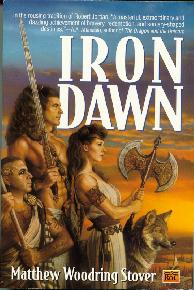

IRON DAWNby Matthew Woodring StoverRoc0-451-45590-8402pp/$12.95/May 1997 |
 |
Reviewed by Steven H Silver
Before examining the text of Matthew Woodring Stover's Iron Dawn, I would like to turn my attention to the production value of the physical volume. Although I have no problem paying for a trade paperback, I expect the book to be better made than a mass market paperback. In this case, Roc has used a cheap paper, reminiscent of newsprint, and a thin cover, easily given to bending and cracking. If Roc is going to produce trade paperbacks, it would be nice if they invested money in the process. Now, on to the text of the book.
Set five years after the end of the siege of Ilium, Iron Dawn tells the story of Barra, a thirty year old Pict who arrived in Tyre about the same time the Greeks arrived at the walls of Troy.
Barra and her companions, the Egyptian Kheperu and the Greek Leucas, must make their way in a Tyre ruled by houses which seem to be based on the Mafia families of Mario Puzo. Upon their arrival, they are thrust into the middle of an intrigue which threatens to topple the major houses of Tyre.
The banter between the characters seems to be aiming to reflect the Hepburn/Grant banter of Bringing Up Baby or The Philadelphia Story, but instead comes across as humorless. These exchanges, added to Barra, Kheperu and Leucas' mentalities, make the characters seem to almost be modern people transplanted into the ancient world: untouched by the sensibilities of the cultures in which they were supposed to have grown up. They seem to be able to force their version of society on others as evidenced by the fact that although men find it strange to deal with a woman instead of her two male companions, in all cases the men quickly accept the situation.
Despite the relative lack of fantastic creatures and mystical places, Iron Dawn frequently reads as if the characters and settings were drawn from a role-playing game. Much of this feeling is because of the randomness of the characters' backgrounds and the amount they have done prior to the beginning of the novel. Stover's acknowledgements, in which he thanks several friends for "many hours of. . . role-playing." supports this feeling.
Several anachronisms appear throughout the novel. Barra's Celtic village has a distinctly Saxon name. She refers to a liege lord, a medieval concept. Stover's characters also are aware of syllogisms, although that thought process was not codified until Aristotle in the fourth century BC, nine centuries after the action of Iron Dawn. Finally, the first recorded reference to the Celtic society to which Barra belongs did not exist quite as early as Stover represents.
Despite these drawbacks, Stover has written a mystery with enough questions that readers will want to read to the end of the book to discover the various secrets Barra and her partners are keeping from each other.
| Return to |